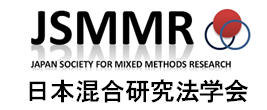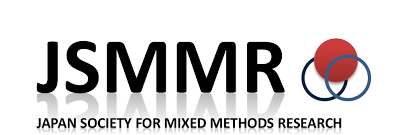Post-Conference WorkshopsDate&Time: Sep. 16, 2019 (Mon) 14:00-17:00Language: English (POST-01, 02, & 04) / English with Japanese Language Support (POST-03 & 05)
POST-01: Post-Conference Workshops 1 Monday Sep.16, 14:00-17:00(Rm.386) (Pre-registration required) Fully Integrated Mixed Methods Research
Lecturer(s): Dr. Elizabeth G. Creamer(School of Education, Virginia Polytechnic Institute and State University) Expected level of participants: Entry・Beginners ・Intermediate・Advanced Style: Exercise-based (typical workshop)・ Lecture・Participatory・Consultation (participants can bring their own projects/issues) Language: English Maximum number: 45 Aims/Learning objective: By the close of the workshop participants will have a better idea of the many possible ways there are to integrate qualitative and quantitative approaches. Additional learning outcomes include the ability to 1.Distinguish between multi-methods and mixed methods. 2.Identify major rationales for integrating qualitative and quantitative approaches. 3.Distinguish between a basic and advanced mixed methods design. 4.Envision formative and summative ways to use a joint display. 5.Appreciate the potential contribution of discontinuities between qualitative findings and quantitative results. 6.Identify several different ways to quantify qualitative data, including through scale coding and coding an image. 7.Identify several different ways to qualify quantitative results. 8.Consider several different ways to highlight integration during reporting. Summary of the contents: The workshop includes several hands-on activities involving coding and quantification. Messages for the participants: Participants will find it helpful to get an introduction to a fully integrated approach by reading: A Primer About Mixed Methods Approaches for Research in an Educational Context" available at https://www.ijlter.org/index.php/ijlter/article/view/700 Brief biography: Please see “Plenary” page for 18.
POST-02: Post-Conference Workshops 2 Monday Sep.16, 14:00-17:00(Rm.387) (Pre-registration required) Designing Mixed Methods Research Under Complex Conditions
Lecturer(s): Cheryl Poth (University of Alberta) Expected level of participants: Entry・Beginners・Intermediate・Advanced Style: Exercise-based (typical workshop)・ Lecture・Participatory・Consultation (participants can bring their own projects/issues) Language: English Maximum number: 20 Aims/Learning objective: We will consider three key questions (also serve as learning objectives): 1. What distinguishes mixed methods research under conditions of complexity 2. How can researchers avoid common dilemmas when designing mixed methods studies under complex conditions? 3. What recent understandings of adaptive practices can be incorporated into a complexity- sensitive approach to designing mixed methods research? Summary of the contents: Are you interested in designing mixed methods research under complex conditions but are unsure of where to start? If so then this workshop is for you! Mixed methods research requires specialized skills that bridge and extend existing qualitative and quantitative research skills and complex conditions require rethinking some of our traditional practices. Following an introduction of the adaptive practices comprising a complexity-sensitive approach, opportunities for individual reflections, small working group activities, and large group discussions will be embedded and encouraged. Messages for the participants: Either of the following are recommended as pre-workshop readings (Please note the first is open-access to all at: https://ijmra.org/inaugural-special-issue/ ): Poth, C. (2018). The curious case of complexity: Implications for mixed methods research practices. International Journal of Multiple Research Approaches, 10(1), 403-411. doi:10.29034/ijmra.v10n1a27 Poth, C. (2018). Innovation in mixed methods research: A practical guide to integrative thinking with complexity. London: UK Brief biography: Please see “Plenary” page for 20.
POST-03: Post-Conference Workshops 3 Monday Sep.16, 14:00-17:00(Rm.388) (Pre-registration required) Using joint displays for designing, analyzing and presenting mixed methods research
Lecturer(s): Michael D. Fetters (University of Michigan) Expected level of participants: Entry・Beginners ・Intermediate・Advanced Style: Brief lecture - participatory with consultations on participants’ own projects. Language: English with Japanese language support Maximum number: 30. Aims/Learning objective: Participants who desire to work on their own projects should have access to their original data. Upon completion of the workshop, participants will be able to: 1.Describe three types of joint displays for mixed methods project planning, analysis, and presentation of findings. 2.Apply the introduced fundamentals of mixed methods joint display development by completing worksheets for each type of joint display, and for those with their own projects, using their own projects as the basis for their worksheets. 3.Develop draft mixed methods joint displays suitable for use in actual research planning, analysis and presentation of mixed methods findings. Summary of the contents: Participants who do not have their own project will use a designated mixed methods project for the workshop. Messages for the participants: Suggested reading: Guetterman TC, Fetters MD, Creswell JW. Integrating quantitative and qualitative results in health science mixed methods research through joint displays. Ann Fam Med, 13(6):554-61, 2015. doi: 10.1370/afm.1865 Brief biography: Michael D. Fetters BA, MD, MPH, MA is Professor of Family Medicine, University of Michigan. POST-04: Post-Conference Workshops 4 Monday Sep.16, 14:00-17:00(Rm.377) (Pre-registration required) Holistic Ways of Knowing
Lecturer(s): Christine S. Davis (University of North Carolina at Charlotte) Expected level of participants: Entry・Beginners・Intermediate・Advanced Style: Exercise-based (typical workshop)・ Lecture・Participatory・Consultation (participants can bring their own projects/issues) Language: English Maximum number: 25 Aims/Learning objective: This workshop is intended for people at all levels of research experience and expertise. Participants will explore their own research topic or question through various ways of knowing—contemplative, embodied, aesthetic, and dialogic methods of inquiry. Learning objective: As a result of attending this workshop, participants will be able to: 1.Utilize various ways of knowing to more deeply understand their research topic; 2.Explain how different ways of knowing enhance understanding in different ways; 3.Explain how a holistic approach to inquiry enhances scholarly and personal understanding. Summary of the contents: The workshop will be experiential and participatory. Participants will engage in activities in which they explore their own research topic or question through contemplation; multi-sensory embodiment; poetry; and collaboration (dialogue). Through these activities, participants will experience flashes of inspiration, discover new connections, envision new perspectives, and engage in sensemaking. Participants will leave with new insights and ideas related to their research topic as well as new skills and suggestions for future research. Messages for the participants: This workshop is ideal for you if you have a research topic or question you would like to explore in different ways, if you want to generate new ideas, or if you would like to learn an intentional way to explore various ways of knowing. This will be a hands-on and energetic three hours. It is appropriate for people at all levels of research experience and expertise. Bring a topic or research question to work with. Brief biography:Christine S. Davis, Ph.D. is a Professor in the Communication Studies Department at the University of North Carolina at Charlotte. She is a Health Humanities scholar, ethnographer, and poet; her research interests are in the intersection of communication, culture, and health, in the areas of children’s health, end-of-life communication, and disability. POST-05: Post-Conference Workshops 5 Monday Sep.16, 14:00-17:00(Rm.378) (Pre-registration required) Advice for Faculty: Mentoring Students Conducting Mixed Methods Research
Lecturer(s):
Expected level of participants: Entry・ Beginners・Intermediate・Advanced Style: Exercise-based (typical workshop), Lecture, Exercise-Based, and Participatory Consultation (participants can bring their own projects/issues): YES, some experience in mentoring students in mixed methods would be ideal. Language: English with Japanese language support Maximum number: 40 Aims/Learning objective: The intended participants are faculty in universities/colleges and doctorate students who want to or are presenting mentoring students on mixed methods projects. Learning objective: When the workshop finishes, the faculty who are mentoring students will: 1.Understand the basic characteristics of mixed methods research (data mining, integration, designs) 2. Consider their own self-development as a mentor for students conducting mixed methods research, and have a number of strategies they can use to effectively mentor students. Summary of the contents: Topics to be addressed will consist of suggestions for working with students on mixed methods projects. These topics will include: advice for the self-development of the faculty member as a mixed methods methodologist (understanding the core concepts of insight, integration, and designs, workshops available for training), essential books to read); and faculty mentoring strategies (the student skills needed, models and templates of good mixed methods research, and the importance of a personal student investment by working on a project). A worksheet will be provided that enables the participant to write down their approaches and share them with the entire group. Messages for the participants: We hope that you will share our experiences with us, experiences that have both been positive and encouraging as well as challenging. Brief biography:John W. Creswell, PhD, who has mentored hundreds of graduate students in mixed methods in the social and health sciences during his 45-year career at two major universities in the US. It will also be co-presented by Mariko Hirose, PhD, faculty at Kwansei Gakuin University. [Go to the conference homepage] [大会トップページに戻る] |
|
|



